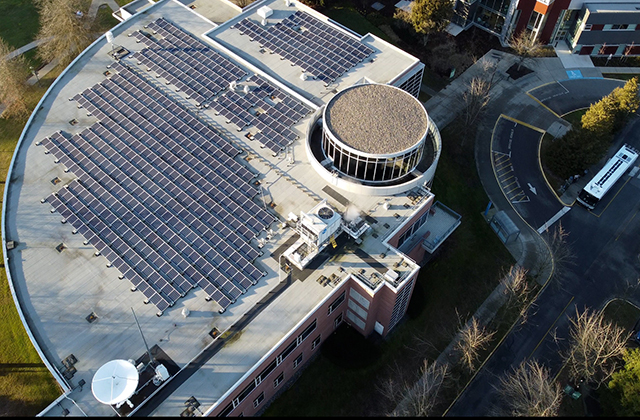Reaching for the STARS: UFV to improve sustainability practices through prestigious rating system
Walking through any UFV campus, it is hard to miss some of the environmentally friendly upgrades. Whether it’s a water fill station or the solar panels atop Building G, UFV is making significant progress in their goal to be a post-secondary leader in sustainability.
Part of the journey is being able to validate not only the work that has been done, but identify what needs to be done. Accountability and a commitment to higher standards are reasons why UFV has decided to participate in the STARS (Sustainability Tracking, Assessment, and Rating System) framework.
“We believe receiving an authentic STARS review enables us to compare our progress to other universities,” says Jennifer Martel, sustainability coordinator at UFV’s Office of Sustainability. “This is not a comparison on who is better, it’s more so about being collaborative and seeing where we might be falling short in some areas, or maybe we’re excelling. Through sharing ideas, we can also provide guidance to each other.”
Established by the Association for the Advancement of Sustainability in Higher Education (AASHE), STARS is an innovative, voluntary self-reporting framework for colleges and universities to gauge progress toward sustainability and be acknowledged for sustainability leadership. More than 800 institutions from around the world, including nearly 100 Canadian institutions, have registered as STARS participants.
According to the UFV Office of Sustainability, STARS will help UFV establish a baseline to measure how they improve their sustainability over time, as well as benchmark with their peers. In the future, STARS may be used as the foundation for sustainability reports, strategic sustainability plans, and as indicators of progression towards the university’s sustainability goals.
“UFV has a history of over a decade of great work towards sustainability and energy management,” says Mark Goudsblom, Associate Vice President, Campus Planning and Facilities Management. He noted that the creation of the Office of Sustainability in 2021 helped the university make a greater “organizational commitment” to a green university.
“As such the next big step is to find where UFV is currently situated in this larger discourse. The STARS assessment will provide the foundation for the Sustainability Strategic Pathway Plan (SSPP) and inform the roadmap needed to get UFV to net-zero by 2030.”
In late 2021, UFV started exploring participating in the STARS rating program. The first phase focuses on data collection, which will be taking place in the coming months. Much of the criteria that UFV will be scored on will be congruent with the UN’s 17 Sustainable Development Goals (SDG) – which are initiatives UFV already closely aligns itself with as documented in the UFV 2020/21 Sustainability Report.
“We’re working with an external company with vast experience consulting other colleges and universities in their STARS reporting and documentation,” says Martel. “It is a very detailed and thorough process because it’s not just about environmental sustainability that we will be evaluated on. There are several academic-related categories and social sustainability aspects to this as well.”
While the process may require a lot of resources and time, the university sees the investment as a valuable step in the road to sustainability.
“The STARS reporting will allow students and the greater UFV community to see our commitment to creating a sustainable learning environment,” Martel says. “But more so than documenting our impact or keeping us accountable, it’s giving us a more accurate vantage point on where we can improve.
“Essentially, how can we be part of the solution and make our world a better place to live?”





